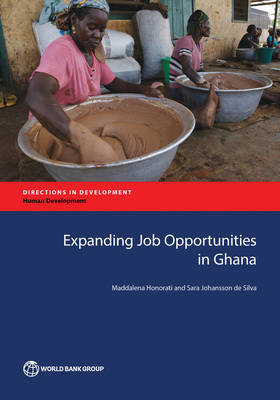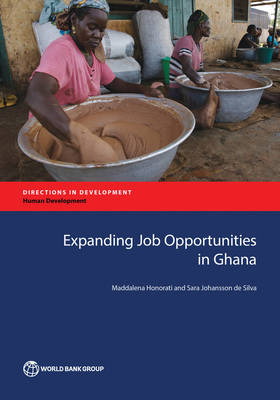
- Afhalen na 1 uur in een winkel met voorraad
- Gratis thuislevering in België vanaf € 30
- Ruim aanbod met 7 miljoen producten
- Afhalen na 1 uur in een winkel met voorraad
- Gratis thuislevering in België vanaf € 30
- Ruim aanbod met 7 miljoen producten
Expanding Job Opportunities in Ghana
status, case studies, and policy options
Maddalena Honorati, Sara Johansson De SilvaOmschrijving
Ghana was, until very recently, a success story in Africa, achieving high and sustained growth and impressive poverty reduction. However, Ghana is now facing major challenges in diversifying its economy, sustaining growth, and making it more inclusive. Most of the new jobs that have been created in the past decade have been in low-earning, low-productivity trade services. Macroeconomic instability, limited diversification and growing inequities in Ghana s labor markets make it harder for the economy to create more jobs, and particularly, better jobs. Employment needs to expand in both urban areas, which will continue to grow rapidly, and rural areas, where poverty is still concentrated. The current fiscal and economic crisis is heightening the need for urgent reforms but limiting the room for maneuver and increasing pressure for a careful prioritization of policy actions. Going forward, Ghana will need to consider an integrated jobs strategy that addresses barriers to the business climate, deficiencies in skills, lack of competitiveness of job-creating sectors, problems with labor mobility, and the need for comprehensive labor market regulation. Ghana needs to diversify its economy through gains in productivity in sectors like agribusiness, transport, construction, energy, and information and communications technology (ICT) services. Productivity needs to be increased also in agriculture, in order to increase the earnings potential for the many poor who still work there. In particular, Ghana s youth and women need help in connecting to these jobs, through relevant skills development and services that target gaps in information about job opportunities. Even with significant effort, most of Ghana s population will continue to work in jobs characterized by low and fluctuating earnings for the foreseeable future, however, and they will need social safety nets that help them manage vulnerability to income shortfalls. More productive and inclusive jobs will help Ghana move to a second phase of structural transformation and develop into a modern middle-income economy."
Specificaties
Betrokkenen
- Auteur(s):
- Uitgeverij:
Inhoud
- Aantal bladzijden:
- 160
- Taal:
- Engels
- Reeks:
Eigenschappen
- Productcode (EAN):
- 9781464809415
- Verschijningsdatum:
- 25/10/2016
- Uitvoering:
- Paperback
- Formaat:
- Trade paperback (VS)
- Afmetingen:
- 178 mm x 254 mm
- Gewicht:
- 290 g

Alleen bij Standaard Boekhandel
Beoordelingen
We publiceren alleen reviews die voldoen aan de voorwaarden voor reviews. Bekijk onze voorwaarden voor reviews.











